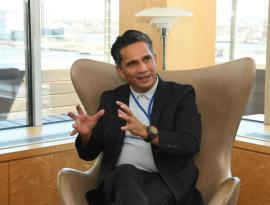Could Europe benefit from Trump's 'assault on science'?

Barely six weeks into his second term, the Trump administration's cost-cutting measures in science and technology are sending ripples across the global research landscape. While these actions are perceived by some as detrimental to science in the United States, they may inadvertently create opportunities for research institutions in Europe and beyond.
The journal Nature has characterized President Trump's policies as an "assault on science," citing the administration's decisions to lay off thousands of employees at key US science agencies. These agencies include NASA, the Centers for Disease Control and Prevention (CDC), and the National Oceanic and Atmospheric Administration (NOAA), the latter being a crucial hub for climate and weather research. The job cuts have impacted critical areas such as nuclear safety, disease surveillance (including measles and avian flu), extreme-weather forecasting, and climate research.
Even scientists who have managed to retain their positions within American agencies and research institutes are expressing concerns about their future. They report facing funding and hiring freezes, restrictions on data transfer, and censorship related to climate change, gender studies, and vaccine hesitancy.
However, this situation may present a unique opportunity for Europe. Patrick Cramer, President of the Max Planck Society in Germany, sees the potential for a "US science brain drain" as a chance to recruit talent that would have been otherwise inaccessible. Applications from US scientists to the Max Planck Institutes have reportedly doubled or even tripled in some cases.
Christina Beck, head of communications at the Max Planck Society in Munich, emphasizes the importance of being prepared to welcome outstanding researchers who may want to leave the US. Universities and research centers across Germany anticipate a surge in applications from American scientists. Some European research institutes are actively working to attract these researchers by streamlining the relocation process and providing a supportive environment for their work.
France's Aix-Marseille University (AMU) has taken a proactive step by establishing a program specifically designed to attract scientists whose research may face censorship in the US. The university aims to provide these researchers with an environment that fosters innovation, excellence, and academic freedom.
Major European science innovation and funding agencies are also exploring ways to attract US-based scientists. Michiel Scheffer at the European Innovation Council (EIC) has indicated that the EIC board will discuss a concept to welcome scientists from the US. The European Commission is considering the creation of a "special passport" for scientists, an EU visa policy aimed at attracting talented researchers from the US and other countries where their work may be hindered.
It's not just Europe that is looking to capitalize on this situation. The Chinese government has announced its intention to expand its efforts to attract researchers affected by Trump's funding cuts. South Korea is also formulating a response, with plans to revise visa policies to make it easier for foreign scientists to work in the country.
While some European science funders caution against exploiting the challenges faced by US-based scientists, many believe that Trump's science policies will have global repercussions. They argue that scientific research is inherently an international and collaborative endeavor. There are already indications that cuts to US research have affected projects in other countries.
In response to the Trump administration's policies, researchers and science supporters have organized protests in cities across the US and Europe. These "Stand Up for Science" protests, inspired by the March for Science movement, demonstrate global solidarity and a commitment to upholding the importance of scientific research.











